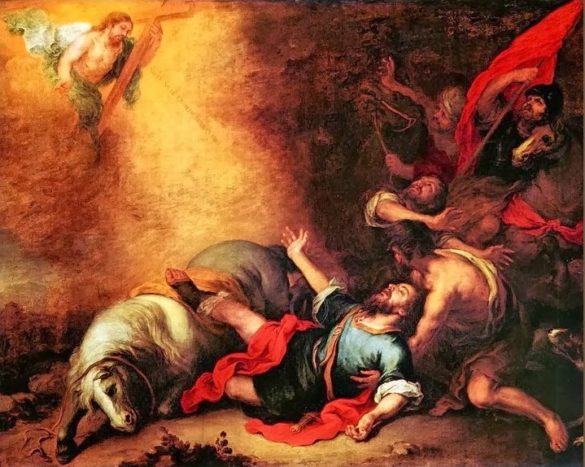This Tuesday was the feast of the Conversion of St. Paul the Apostle, celebrating the famous day on which the zealous man known as Saul, a ferocious persecutor of the earliest churches, was struck blind by a light blazing brighter than the sun on the road to Damascus, cast down to the ground by a voice crying out: “Saul, Saul, why are you persecuting me? It hurts you to kick against the goads.” (Acts 26:14) Saul’s whole identity is transformed, down to his very name: Saul the persecutor becomes Paul the apostle, fostering the growth of the new Christian churches around the Mediterranean as zealously as he’d once tried to destroy them.

As a paradigm for spiritual life it’s a bit imposing. While there are many examples of profound change in the lives of Christians all around the world, few of our stories are nowhere near as dramatic as Paul’s. Our paths have fewer sudden swerves and many more gentle turns, and when they do begin to meander in another direction, it rarely comes with such clear signs, with blazing lights and booming voices and traveling companions, fallen to the ground.
We don’t all have Paul’s kind of conversion. But we do all need to be converted.
Not “converted” in the sense of “converting” from one religion to another, but in the sense of what the Christian monastic traditional calls “conversion of life.” “Conversion,” writes Brother Curtis Almquist, SSJE, “is about our life-long turning and returning to Christ.” It is not a matter of self-denial, of giving up the things that are best about ourselves, but of pruning, of trimming away the things that are preventing us from living fully in God’s love, of “co-operating with how Jesus wants to set us free.”
Blinded by the light, Paul is unable to see until he meets Ananias, one of the very Christian disciples whom Paul had been headed to Damascus to persecute. God urges Ananias, despite his (reasonable) skepticism, to go to Paul, and when he does, he lays his hands on him and greets him, this persecuting enemy, as “Brother.” “Brother Saul,” he says, “the Lord Jesus, who appeared to you on your way here, has sent me so that you may regain your sight and be filled with the Holy Spirit.” And immediately, famously, “something like scales fell from his eyes, and his sight was restored.” (Acts 9:17-18)
“What needs to be changed in us?” asks the nun and spiritual writer Joan Chittister, OSB. “Anything that deludes us into thinking that we are not simply a work in progress, all of whose degrees, status, achievements, and power are no substitute for the wisdom that a world full of God everywhere, in everyone has to teach us.”
These things are like so many scales, obscuring our vision. They prevent us from seeing God face to face. They prevent us from seeing our neighbors, near and far, as the beloved children of God. They prevent us from seeing ourselves, in fact, as the beloved children of God. And in proclaiming his unconditional love for us—in declaring that we are beloved, whatever our achievements or failures, weaknesses or strengths—Jesus invites us to yield to God’s grace, to the Holy Spirit’s slow work of converting us as we all walk roads that stretch beyond Damascus to the very ends of our days.
O God, who by the preaching of your apostle Paul has caused the light of the Gospel to shine throughout the world: Grant, we pray, that we, having his wonderful conversion in remembrance, may show ourselves thankful to you by following his holy teaching; through Jesus Christ our Lord, who lives and reigns with you, in the unity of the Holy Spirit, one God, now and for ever. Amen.